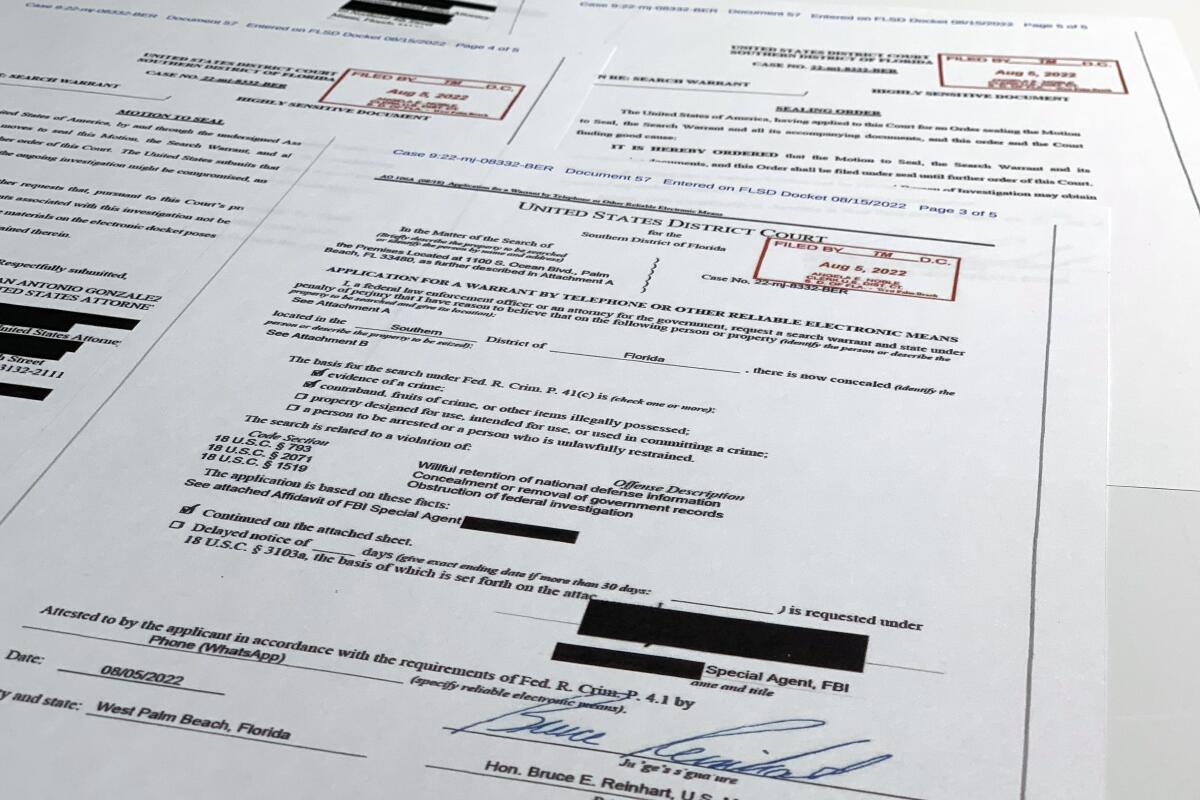Trump seeks ‘special master’ to review Mar-a-Lago documents

- Share via
WASHINGTON — Lawyers for former President Trump on Monday asked a federal judge to prevent the FBI from continuing to review documents recovered from his Florida estate earlier this month until a neutral special master can be appointed.
The attorneys asserted in a court filing, their first since the FBI search of Mar-a-Lago two weeks ago, that the sets of documents taken from the residence were “presumptively” covered by executive privilege.
“This matter has captured the attention of the American public. Merely ‘adequate’ safeguards are not acceptable when the matter at hand involves not only the constitutional rights of President Trump, but also the presumption of executive privilege,” the attorneys wrote.
Magistrate Judge Bruce Reinhart affirmed his finding from a hearing last week that the Justice Department hadn’t made its case to keep the affidavit sealed.
Separately Monday, a federal judge acknowledged that redactions to an FBI affidavit spelling out the basis for the search might be so extensive as to make the document “meaningless” if released to the public. But he said he continued to believe it should not remain sealed in its entirety because of the “intense” public interest in the investigation.
A written order from U.S. Magistrate Judge Bruce Reinhart largely restates what he said in court last week, when he directed the Justice Department to propose redactions about the information in the affidavit that it wants to remain secret. That submission is due Thursday at noon.
Justice Department officials have sought to keep the entire document sealed, saying disclosing any portion of it risks compromising an ongoing criminal investigation, revealing information about witnesses and divulging investigative techniques. They have advised the judge that the necessary redactions to the affidavit would be so numerous that they would strip the document of any substantive information and make it effectively meaningless for the public.
Will political candidates tap into youth culture on TikTok for the midterm elections? Or will they come off like the ‘How Do You Do, Fellow Kids?’ meme?
Reinhart acknowledged that possibility in his Monday order, writing, “I cannot say at this point that partial redactions will be so extensive that they will result in a meaningless disclosure, but I may ultimately reach that conclusion after hearing further from the Government.”
Several news organizations, including the Associated Press, have urged the judge to unseal additional records tied to this month’s search of Mar-A-Lago, when FBI officials said they recovered 11 sets of classified documents, including top secret records, from the Florida estate.
Of particular interest is the affidavit supporting the search, which presumably contains key details about the Justice Department’s investigation examining whether Trump retained and mishandled classified and sensitive government records. Trump and some of his supporters have also called for the document to be released, hoping it will expose what they contend was government overreach.
Tuesday’s primary elections feature two top Florida Democrats squaring off for the right to face Republican Gov. Ron DeSantis. Rep. Matt Gaetz faces a primary and Rep. Val Demings is vying to take on Sen. Marco Rubio.
In his written ruling, Reinhart said the Justice Department had a compelling interest in preventing the affidavit from being released in its entirety. But he said he did not believe it should remain fully sealed, and said he was not persuaded by the department’s arguments that the redaction process “imposes an undue burden on its resources.”
“Particularly given the intense public and historical interest in an unprecedented search of a former President’s residence, the Government has not yet shown that these administrative concerns are sufficient to justify sealing,” he wrote.
More to Read
Get the L.A. Times Politics newsletter
Deeply reported insights into legislation, politics and policy from Sacramento, Washington and beyond. In your inbox three times per week.
You may occasionally receive promotional content from the Los Angeles Times.












